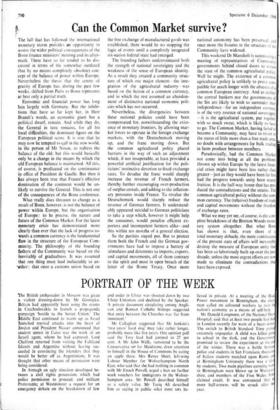Can the Common Market survive?
The lull that has followed the international monetary storm prcivides t*i. opportunity lo assess the wider political consequences of the Bonn finance ministers' meeting and its after- math. These have so far tended to be dis- cussed in terms of the somewhat outdated (but by no means completely obsolete) con- cept of the balance of power within Europe. Nevertheless the thesis that the centre of gravity of Europe has, during the past few weeks, shifted from Paris to Bonn represents at best only a partial truth.
Economic and financial power has long lain largely with Germany. But the inhibi- tions that have so far kept her, in Herr Brandt's words, an economic giant but a political dwarf, remain. And while they do, the General in turn remains, for all his local difficulties, the dominant figure on the European political scene. It is true that he may now be tempted to call in the new world, in the person of Mr Nixon. to redress the balance of the old; but this would basically only be a change in the means by which the old European balance is maintained. All this, of course, is predicated on the continuance in office of President de Gaulle. But then it has always been true that France's effective domination of the continent would be un- likely to survive the General. This is not one of the consequences of the Bonn conference.
What really does threaten to change as a result of Bonn, however, is not the balance of power within Europe, but the organisation of Europe: to be precise, the nature and future of the Common Market. For the latest monetary crisis has demonstrated more clearly than ever that the lack of progress to- wards a common currency is the fundamental flaw in the structure of the European Com- munity. The philosophy of the founding fathers of the Community was based on the Inevitably of gradualness. It was assumed that one thing must lead ineluctably to an- 'ether: that once a customs union based on the free exchange of manufactured goods was established, there would be no stopping the logic of events until a completely integrated six-nation federal state had emerged.
The founding fathers underestimated both the strength of national sovereignty and the weakness of the sense of European identity. As a result they created a community struc- ture of which one major element—the inte- gration of the agricultural industry—was based on the fiction of a common currency, and in which the rest assumed an abandon- ment of distinctive national economic poli- cies which has not occurred.
Nevertheless, the divergencies between these national policies could have been compensated for, notwithstanding the exist- ence of monetary frontiers, by allowing mar- ket forces to operate in the foreign exchange markets, with the Deutschemark moving up, and the franc moving down. But the common agricultural policy placed barriers in the way of such an adjustment which, if not insuperable, at least provided a powerful artificial justification for the poli- ticians' instinctive devotion to fixed exchange rates. To devalue the franc would sharply increase the revenue of French farmers, thereby further encouraging over-production of surplus cereals, and adding to the inflation- ary pressures inside France. To revalue the Deutschemark would sharply reduce the revenue of German farmers. It understand- ably appeared suicidal' to German politicians to take a step which, however it might help the consumer, would penalise efficient ex- porters and incompetent farmers alike—and this within ten months of a general election.
So the parities stayed put. But to protect them both the French and the German gov- ernments have had to impose a battery of stimulants and deterrents to imports, exports, and capital movements, all of them contrary to the spirit and most in open breach of the letter of the Rome Treaty. Once more national autonomy has been preserved: and once more the fissures in the structure of the Community haVe widened.
This weekend Dr Mansholt is summoning a meeting of representatives of Community , governments behind closed doors to review the state of the common agricultural policy, Well he might. The existence of a common agricultural policy is unlikely to prove corn. patible for much longer with the absence of a common European currency. And as neither the central bankers nor the governments of the Six are likely to wish to surrender their independence—for an independent currency is of the very essence of national sovereignly —it is the agricultural system, put together with so much sweat, which is likely to have to go. The Common Market, having failed to become a Community, may have to revert to the status of little more than a free trade area, no doubt with arrangements for bulk trading in farm produce between menibers.
Paradoxically, had the Common Market not come into being at all the problems thrown up within Europe by the latest finan. cial crisis might have been less rather than greater—just as they would have been far less had the progress towards unity been nearer fruition. It is the half-way house that has pro- duced the contradictions and the strains. The common agricultural policy without the com- mon currency. The (relative) freedom of trade and capital movements Without the freedom of exchange rates.
What we may yet see, of course, is the com- plete breakdown of the Bretton Woods mone- tary system altogether. But what Bonn has shown is that, even short of total monetary debacle, the mere continuance of the present state of affairs will inexorabl destroy the measure of European unity tha has been so laboriously built up over the pas decade, unless the most urgent efforts are no made to eliminate the contradictions (ha' have been exposed.


































 Previous page
Previous page